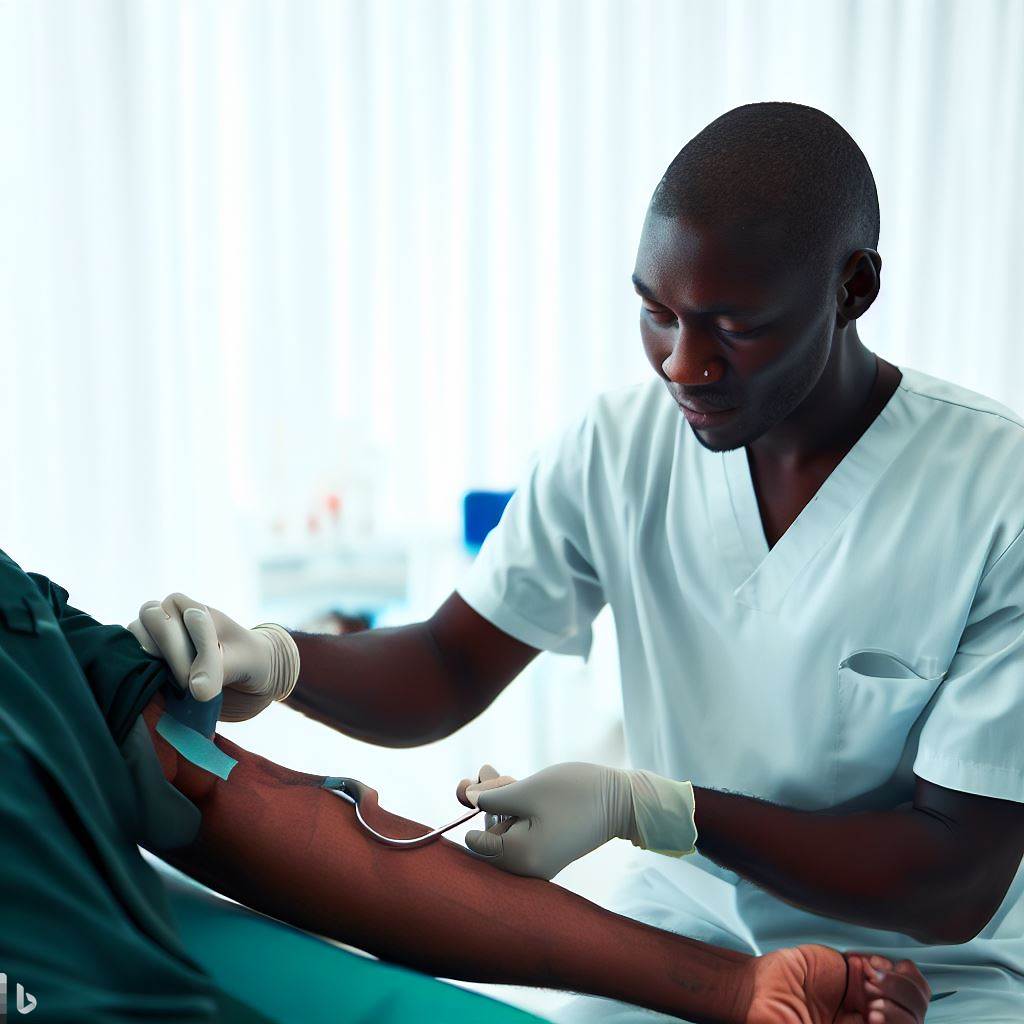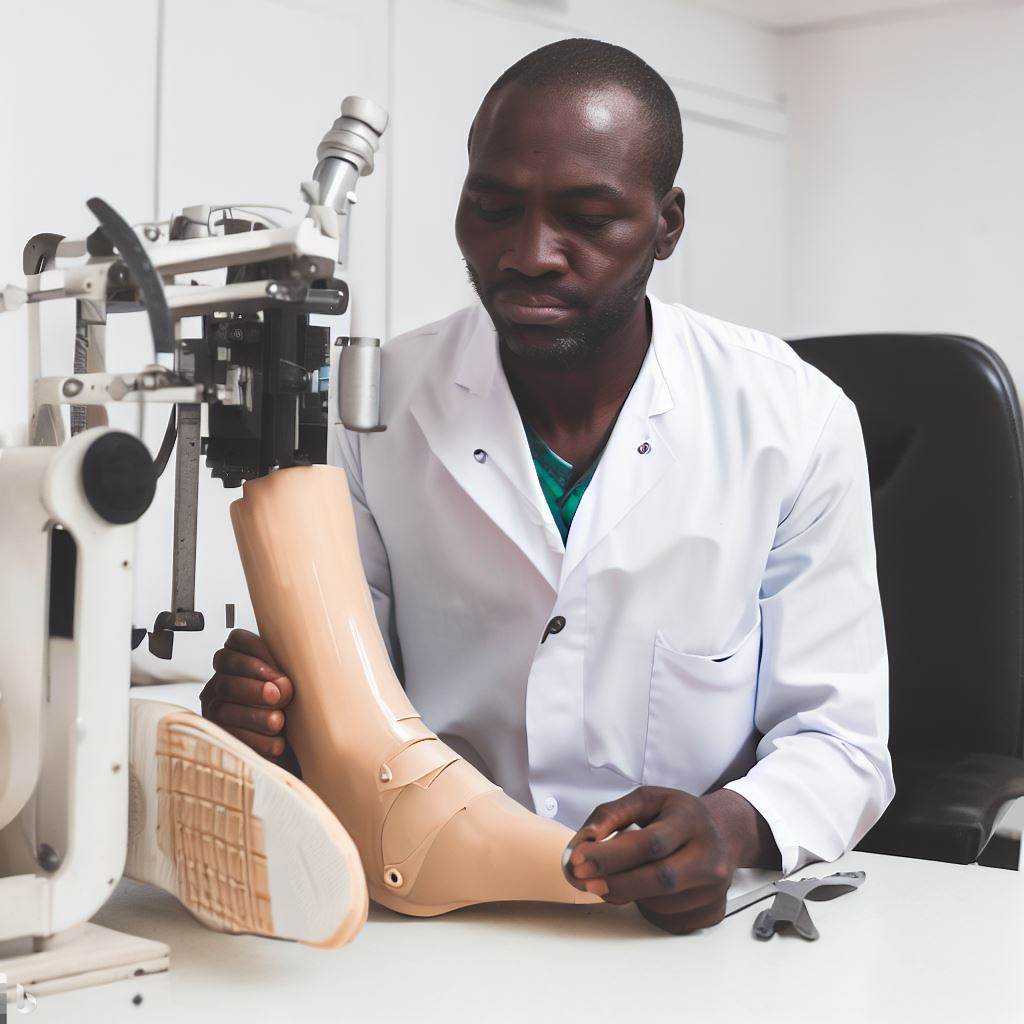Introduction
Pediatricians in Nigeria grapple with daunting challenges. Addressing these issues is vital for child healthcare.
This blog aims to explore and propose solutions.
Pediatricians in Nigeria face daunting challenges daily. These obstacles significantly impact child healthcare, making it crucial to address them effectively.
This blog post delves into the complexities surrounding pediatric practice in Nigeria and highlights the urgent need for solutions.
By identifying these challenges and understanding their implications, we can work towards creating a brighter and healthier future for the children of Nigeria.
Let’s dive deep into the issues at hand and explore potential strategies to support and empower pediatricians in providing the best possible care for their young patients.
Overview of Pediatric Healthcare in Nigeria
Current State of Pediatric Healthcare in Nigeria
Pediatric healthcare in Nigeria faces numerous challenges, hindering the delivery of quality care to children.
Limited funding and inadequate infrastructure contribute to the deteriorating state of pediatric healthcare. Insufficient healthcare personnel, including pediatricians, exacerbate the burden on the system.
Inadequate training and education opportunities limit the expertise and knowledge of healthcare professionals.
The lack of access to essential medical equipment and drugs further hampers pediatric healthcare services.
Inconsistent healthcare policies and regulations add to the complexity of providing effective care to children.
Importance of Pediatricians in the Healthcare System
Pediatricians play a crucial role in the healthcare system by specializing in the care of infants, children, and adolescents.
They are trained to address the unique medical, developmental, and emotional needs of pediatric patients.
Pediatricians provide comprehensive healthcare services, including preventive care and treatment of childhood diseases.
Their expertise contributes to early diagnosis and intervention, preventing complications and promoting long-term well-being.
Pediatricians guide parents in making informed decisions regarding their child’s health, growth, and development.
They advocate for children’s health, ensuring their rights to quality healthcare and a safe environment.
Role of Pediatricians in Promoting Child Health and Well-being
Pediatricians are at the forefront of promoting child health through routine check-ups and immunizations.
They monitor children’s growth and development, offering guidance on nutrition, exercise, and healthy lifestyle choices.
Pediatricians identify and manage common childhood conditions, such as respiratory infections and gastrointestinal disorders.
They screen for developmental delays and provide early intervention, improving long-term outcomes.
Pediatricians collaborate with other healthcare professionals to address complex medical and social issues affecting children.
They educate parents and caregivers on injury prevention, vaccination importance, and child safety measures.
Pediatricians in Nigeria face significant challenges in delivering quality care due to limited resources, inadequate infrastructure, and the scarcity of healthcare professionals.
Despite these obstacles, their role in promoting child health and well-being remains paramount.
Collaborative efforts between the government, healthcare organizations, and medical professionals are needed to address these challenges and ensure that every child in Nigeria receives the healthcare they deserve.
Read: Continuing Education for Occupational Therapists in Nigeria
Challenges Faced by Pediatricians in Nigeria
Shortage of pediatricians in the country
The current ratio of pediatricians to children in Nigeria is significantly imbalanced. This shortage has a detrimental impact on the delivery of healthcare services to children.
Nigeria is currently facing significant challenges in the field of pediatrics. The shortage of pediatricians in the country has become a pressing concern.
The current ratio of pediatricians to children in Nigeria is significantly imbalanced, with a limited number of doctors available to cater to the healthcare needs of a large population of children.
This shortage has a detrimental impact on the delivery of healthcare services to children, resulting in compromised quality of care and inadequate access to specialized medical attention.
Inadequate infrastructure and resources
There is a lack of proper medical facilities and equipment in Nigeria, hindering pediatricians’ ability to provide optimal care.
Obtaining necessary medical supplies poses numerous challenges for pediatricians in Nigeria.
Another major challenge faced by pediatricians in Nigeria is the inadequate infrastructure and resources available to support their work.
The lack of proper medical facilities and equipment further hampers their ability to provide optimal care to their patients.
This scarcity of resources not only affects the quality of care provided but also poses significant barriers to conducting thorough examinations, diagnostics, and the implementation of appropriate treatment plans.
Read: The Path to Becoming a Surgeon in Nigeria
Limited access to quality education and training
Acquiring specialized pediatric medical education in Nigeria is riddled with challenges. The limited training opportunities for pediatricians have a negative impact on healthcare outcomes.
In addition to inadequate infrastructure, pediatricians also face challenges in obtaining necessary medical supplies.
The limited availability and high cost of essential medical supplies make it difficult for pediatricians to access the tools and equipment required to deliver proper care to their young patients.
This hinders their ability to provide comprehensive treatment and can result in delayed or inadequate medical interventions.
Furthermore, limited access to quality education and training poses yet another challenge for pediatricians in Nigeria.
Acquiring specialized pediatric medical education often requires significant investments in terms of time, money, and effort.
The lack of educational institutions or training programs specific to pediatric medicine limits the opportunities available for aspiring pediatricians to gain the knowledge and skills necessary to provide quality care.
The impact of these limited training opportunities is evident in the healthcare outcomes for children in Nigeria.
Without access to quality education and training, pediatricians may lack the expertise and specialized knowledge needed to effectively address the unique healthcare needs of children.
This deficit in pediatric medical education contributes to suboptimal healthcare outcomes, as children do not receive the level of care they need and deserve.
In the end, pediatricians in Nigeria face several significant challenges that hinder their ability to provide optimal care to children.
The shortage of pediatricians, inadequate infrastructure and resources, and limited access to quality education and training all contribute to compromised healthcare delivery and outcomes.
Recognizing these challenges is crucial in order to address them effectively and ensure that pediatricians in Nigeria can provide high-quality care to the country’s children.
Read: Understanding the Nigerian Mental Health Act: A Guide

Cultural and Socioeconomic Factors
Cultural and socioeconomic factors play a crucial role in shaping the challenges faced by pediatricians in Nigeria.
Understanding the impact of cultural beliefs and practices, as well as socioeconomic disparities, is vital for addressing the healthcare needs of pediatric patients.
Read: Step-by-step Guide to Becoming a Nursing Assistant in Nigeria
Cultural beliefs and practices affecting healthcare
In Nigeria, cultural beliefs and practices have a profound influence on the seeking of pediatric healthcare services. These beliefs often impact decisions related to seeking medical attention for children.
One common cultural belief is the preference for traditional healers or religious leaders over medical professionals.
Many Nigerians have deep-rooted faith in traditional medicine and alternative healing practices, leading them to delay or avoid seeking pediatric healthcare services.
This cultural norm poses a significant challenge for pediatricians as they strive to provide timely and appropriate care.
They often face resistance from parents who believe that traditional healers or religious leaders can effectively address their child’s health issues.
Socioeconomic disparities and their impact on pediatric healthcare
Poverty and inequality have a substantial impact on access to quality pediatric care in Nigeria. The country struggles with high levels of poverty, particularly in rural areas, where healthcare infrastructure is limited.
Many families lack the financial resources to afford proper healthcare for their children.
This leads to delayed or inadequate medical care, resulting in a higher prevalence of preventable diseases and illnesses in the pediatric population.
Pediatricians face immense challenges in providing affordable healthcare services to their patients.
The cost of medical equipment, medications, and specialized treatments often exceeds the financial capabilities of many families.
This leads to a scarcity of resources and a strain on pediatricians trying to meet the healthcare needs of their patients within limited means.
Additionally, the unequal distribution of healthcare facilities further exacerbates the challenges faced by pediatricians.
Medical centers and hospitals are concentrated in urban areas, making it difficult for families in rural communities to access adequate healthcare services.
Limited transportation options combined with high costs pose significant barriers to obtaining pediatric care.
In a nutshell, cultural and socioeconomic factors pose substantial challenges for pediatricians in Nigeria.
Cultural beliefs that prefer traditional healers and religious leaders, as well as socioeconomic disparities, including poverty and inequality, significantly impact access to quality pediatric care.
Addressing these factors is crucial in improving pediatric healthcare outcomes and ensuring equitable access to healthcare services in Nigeria.
Read: The Impact of Nigerian Culture on Psychology Practice
Strategies and Solutions
Title: Strategies and Solutions to Overcome Challenges Faced by Pediatricians in Nigeria
Government initiatives and policies
- Existing governmental efforts: The Nigerian government has implemented various programs to address pediatric healthcare challenges.
- Impact of initiatives: These initiatives have led to improved healthcare access, vaccination rates, and reduced child mortality.
International collaborations and partnerships
- Role of international organizations: International organizations have played a vital role in sharing expertise, resources, and funding.
Role of international organizations: International organizations have played a vital role in sharing expertise, resources, and funding. - Highlight successful partnerships: Collaborations with organizations like WHO and UNICEF have improved medical training, infrastructure, and research in Nigeria.
Importance of community involvement
- Need for community engagement: Community involvement is crucial for raising awareness about child health and disease prevention.
- Role of community-based organizations: Local organizations contribute by organizing health camps, providing education, and supporting medical services.
In fact, tackling challenges faced by pediatricians in Nigeria requires a multi-pronged approach.
Government initiatives have shown promise in enhancing healthcare facilities and access. International collaborations have been instrumental in bringing in expertise and funding.
Equally important is the active participation of communities and community-based organizations in creating awareness and providing support.
By combining efforts at the governmental, international, and grassroots levels, we can strive towards better pediatric healthcare in Nigeria.
Read: How to Prepare for the Physician Assistant Exam in Nigeria
Conclusion
Throughout this blog post, we have explored the numerous challenges faced by pediatricians in Nigeria.
These challenges include inadequate infrastructure, limited access to medical resources, high patient-to-doctor ratios, and a lack of specialized training.
Addressing these challenges is of utmost importance for the well-being of Nigerian children.
Pediatricians play a crucial role in ensuring the health and development of children, and overcoming these obstacles is vital for providing quality healthcare to this vulnerable population.
To improve pediatric healthcare in Nigeria, it is essential for stakeholders such as the government, healthcare organizations, and the public to come together.
Increased investment in healthcare infrastructure, training programs, and the provision of necessary resources are necessary steps towards addressing these challenges.
Together, we can create a better future for Nigerian children by ensuring they receive the best possible care. Let us join hands and make a difference today.




